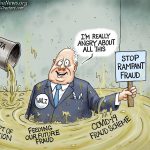
U.S. Government Detects Rogue Cellphone-Spying Devices in D.C.
The U.S. government has finally publicly acknowledged that foreign spies and criminals are attempting to intercept calls and messages by tracking White House officials’ cellphones.
To capture the intel, cellphone-site simulators are being used by spies to get access to messages. These devices are discreet and no larger than a size of a briefcase. They act as legitimate cell towers and trick mobile devices to lock on to them. Then spies can collect information like the exact location of the cellphone and some advanced devices can even plant malware or eavesdrop on calls.
In the past, the federal government had only expressed concerns about this issue behind closed doors.
“In a March 26 letter to Oregon Sen. Ron Wyden, the Department of Homeland Security acknowledged that last year it identified suspected unauthorized cell-site simulators in the nation’s capital. The agency said it had not determined the type of devices in use or who might have been operating them. Nor did it say how many it detected or where,” writes The Associated Press. “The agency’s response, obtained by The Associated Press from Wyden’s office, suggests little has been done about such equipment, known popularly as Stingrays after a brand common among U.S. police departments. The Federal Communications Commission, which regulates the nation’s airwaves, formed a task force on the subject four years ago, but it never produced a report and no longer meets regularly.”
Washington is a hot spot for spies because of the number of national security officials in the area.
Unfortunately, in a reply to Wyden from DHS official Christopher Krebs, he said that the DHS lacks the funding to acquire the equipment to detect these devices. Also, it would require the government to pay for expensive network upgrades.
Aaron Turner, president of the mobile security consultancy Integricell, also said these devices are being used at foreign embassies.
“Every embassy “worth their salt” has a cell tower simulator installed, Turner said. They use them “to track interesting people that come toward their embassies.” The Russians’ equipment is so powerful it can track targets a mile away, he said,” writes The Associated Press.
Wyden also called out the Federal Communications Commission for not taking a tough enough stance on the cellphone industry “despite repeated warnings and clear evidence that our phone networks are being exploited by foreign governments and hackers.”
Back in 2014, after security-company researchers conducted their own sweep in Washington and detected several of these devices, the FCC was alerted. In response, the agency created a task force to address the problem.
But the agency hasn’t achieved much.
“To the extent that there is a major problem here, it’s largely due to the FCC not doing its job,” said Laura Moy of the Center on Privacy and Technology at Georgetown University. She also said the FCC needs to require wireless carriers to protect their networks from these type of security threats and “ensuring that anyone transmitting over licensed spectrum actually has a license to do it.”
Author’s note: Ever since the invention of the telephone, spies have tried to bug these communications. But today’s digital age and mobile systems have created even greater challenges for security. Staying ahead of foreign intel has always been the goal and U.S. spies are likely doing the same thing with these “stingray” devices elsewhere.
Editor’s note: As a former intelligence officer, I can tell you this is a huge issue. Policymakers in D.C. are not very savvy about keeping their communications private, and this opens the door to serious compromise. This is really the job for the likes of FBI and NSA counterintelligence, to track down spies. The FCC is not the right agency for this. The fact that cellular telephones can be targeted in the manner means that current encryption techniques are lacking.




























I'm waiting for when the Reich anoints Trump as a demigod. It's only a matter of time....
Omar is one worthless individual. She should not be in Congress, or for that matter, not in this country.
Larry, you are right, politics should have nothing to do with the FIFA games. Unfortunately the orange ignoramus that you…
Local police are not constitutionally required to enforce federal immigration laws, as immigration enforcement is the responsibility of the federal…
He’s a magarat who hates Somali’s. Sure, she hired that guy. BUSTED